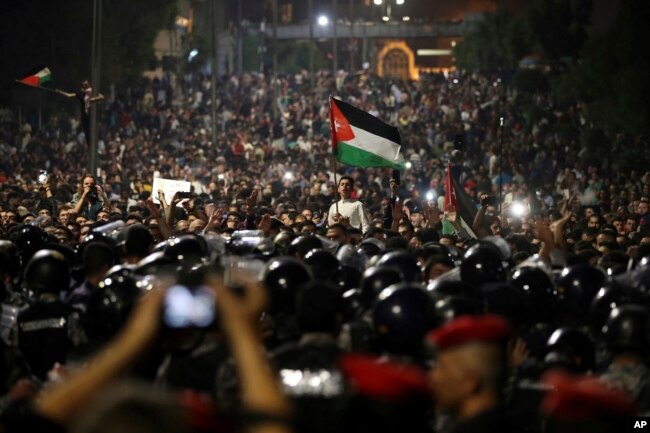
CAIRO, EGYPT — Jordan’s prime minister has resigned, following four days of protests over a new income tax law.
Jordanian Prime Minister Hany al Mulki’s resignation Monday followed four nights of protests in towns and cities across the country, including their focal point outside the prime minister’s office in the capital Amman.
Arab media reports Education Minister Omar Razaz has been asked by King Abdallah to form a new government.
Al Mulki had insisted on presenting his new income tax bill to parliament, despite popular protests.
He said sending the income tax law to parliament [for debate] does not in any way mean that parliament has agreed to it or any part of it.
The government had been trying to push through a variety of tax increases, as part of a loan package agreement with the International Monetary Fund. Jordan currently has a public debt of nearly $40 billion. Tax increases on fuel, electricity and water, along with a new income tax plan have aroused public ire.
Jordanian Police Chief Fadel al Hamoud said Monday several arrests were made during the protests.
He said 60 people were arrested for breaking the law and rioting, including attacking public and private property. He added eight of those arrested were from other Arab countries and that police are trying to determine what they were up to.
Hamoud said 40 members of the country’s security forces were injured during the protests.
He said that firearms have been used against the security forces, along with firecrackers and knives in the area of Amman’s Fourth Circle (where the prime minister’s offices are located).
Jordanian commentator Shehab Makahleh, head of the Geostrategic Media Center and Director of Political Studies at Jordan’s Middle East Institute, told VOA the demonstrations have been “against corruption, not against the regime,” and that protesters “hope to reform the economic system … [by way of] a respectable civil movement.”
Makahleh said he thinks the current crisis may be tied to U.S. efforts to impose a peace settlement between Israel and the Palestinians, referred to in Arab media as the “Deal of the Century.” He claimed such a deal will call on Jordan to give up its custodianship over Jerusalem’s holy sites and could cause political tremors in the Middle East. | voanews

